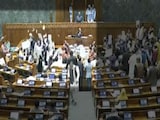The absence of the words "socialist, secular" in English copies of the Constitution distributed to MPs yesterday has provoked a massive controversy a day after the special session officially moved to parliament's new building.
The opposition has called it an "attack" on the Constitution.
Reacting to the charge, Law Minister Arjun Meghwal said the copies featured the "original version" of the Preamble of the Constitution. "When the Constitution came into being, it did not have the words 'socialist, secular'. These words were included in the 42nd amendment of the Constitution in 1976," he pointed out.
The comment fueled more protests as the opposition accused the government of sneaking in a big change without following due process.
"The new copies of the Constitution that were given to us, the one we held in our hands and entered (the new Parliament building), its Preamble doesn't have the words 'socialist secular'," Congress leader Adhir Ranjan Chowdhury said, questioning the intentions of the ruling BJP.
"We know that the words were added after an amendment in 1976, but if someone gives us the Constitution today and it doesn't have those words, it is a matter of concern. Their intention is suspicious. It has been done cleverly. This is a serious matter and we will raise this issue," he said.
"I doubt their intentions as their heart does not seem to be clear on this," added Mr Chowdhury, the leader of the Congress in Lok Sabha.
Binoy Viswam of the CPI-M called the omission a "crime".
Copies of the Constitution were distributed in a gift bag handed to MPs on the opening day of the new parliament building.
The preamble of the Constitution originally described India as a "sovereign, democratic republic".
During the Emergency imposed by the Indira Gandhi-led Congress government, several changes were pushed through the 42nd amendment, and this included adding the words "socialist" and "secular" between "sovereign" and "democratic" and changing "unity of the nation" to "unity and integrity of the nation".
In 1978, many of the changes were reversed but the amended preamble stayed.
In 1994, the Supreme Court said "secularism" is part of the basic structure doctrine, which means that certain basic characteristics cannot be erased.
Once an amendment is notified, the old Constitution should cease to be printed, opposition leaders said. Any change to the Constitution, therefore, would be tampering, they asserted.















